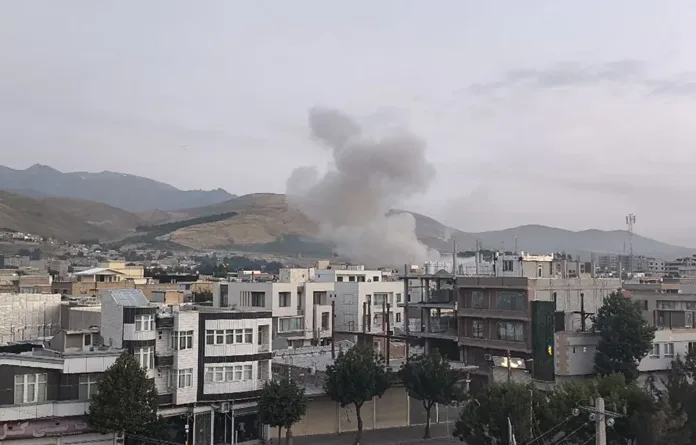In a bold and controversial military move, Israel has launched a devastating airstrike on several nuclear facilities within Iran’s borders, killing General Reza Al-Mansoori, one of Iran’s most senior military commanders. This incident has dramatically escalated tensions across the Middle East, with fears growing over the possible outbreak of a broader regional war. The Israel Iran conflict 2025 is now at the forefront of global attention, with nations worldwide watching the fallout unfold.
The airstrikes, conducted in the early hours of June 12, 2025, reportedly targeted Iran’s top nuclear enrichment centers located in Natanz, Arak, and Fordow. The operation, confirmed by Israeli Defense Forces (IDF), has been described as a “defensive measure” aimed at dismantling Iran’s capacity to develop nuclear weapons.
🔥 The Strike That Shook the Region
Residents in the affected areas reported hearing a series of explosions around 2 a.m., followed by sirens, building collapses, and fireballs lighting up the skies. The images of charred ruins and emergency teams combing through debris have dominated media broadcasts since the attack. According to reports, dozens of Iranian military and scientific personnel were caught in the strike, with General Reza Al-Mansoori confirmed dead on-site at the Fordow nuclear site.
Israel claims the operation was prompted by intelligence indicating that Iran was just weeks away from enriching uranium to weapons-grade levels, a red line that Israel has long vowed not to tolerate.
🎖️ Who Was General Reza Al-Mansoori?
The death of General Reza Al-Mansoori, one of Iran’s most powerful military figures, has intensified the geopolitical shockwaves. Al-Mansoori had served as the Chief of Iran’s Joint Armed Forces and was widely recognized as the architect behind Iran’s long-term regional military doctrine, including nuclear security.
He was present at Fordow conducting a routine inspection and coordinating nuclear defense protocols when the airstrike occurred. His sudden death leaves a leadership vacuum in Iran’s defense establishment and is viewed by many as a major tactical success for Israel—but also a trigger for swift retaliation.
🛑 Iran’s Reaction: “Unforgivable Act of War”
In a strongly worded televised address, Iranian President Ebrahim Rouhani declared the Israeli operation an “unforgivable act of war.” He stated:
“This blatant aggression has murdered our heroes, violated international law, and targeted our sovereign scientific achievements. Our response will be proportionate, resolute, and historic.”
Iran has raised its military alert status to the highest level. Long-range missiles have reportedly been deployed in key regions, while cyber units have begun engaging in digital countermeasures against Israeli systems.
The Iranian parliament, during an emergency session, called for a “unified axis of resistance,” urging allied nations and militant groups in Lebanon, Syria, and Iraq to prepare for coordinated responses.
🛰️ Israel’s Strategic Justification
Israeli Prime Minister Eli Barak addressed his nation, stating the decision to strike was made “after exhausting every diplomatic channel.” He said:
“Iran has advanced its nuclear program far beyond peaceful purposes. We struck to protect our future. The region may be uneasy today, but the alternative was nuclear terror tomorrow.”
The Israel Iran conflict 2025 stems from over two decades of tension over Iran’s nuclear ambitions. While Iran insists its program is for peaceful energy use, Israel and several Western nations have long suspected hidden weaponization plans.
🌍 Global Reactions Pour In
The United Nations Security Council held an emergency closed-door session to assess the situation. Russia and China condemned the airstrike and labeled it as a dangerous precedent, while the United States called for “urgent de-escalation” but did not publicly criticize Israel.
European leaders expressed concern over the legality of the strike, urging both nations to avoid dragging the region into a large-scale war. Oil markets responded immediately, with crude oil prices spiking 15% within hours of the news.
Human rights groups have called for protection of civilians and warned of humanitarian fallout if hostilities continue.
📈 What the Experts Say
Military analysts believe that Israel timed the attack not just based on intelligence reports, but also to disrupt what they viewed as Iran’s final phase of nuclear armament.
Dr. Jonathan Weissman, a Middle East security expert, noted:
“This was not a preemptive strike in the traditional sense. It was a calculated risk to remove key facilities and individuals in one swift blow. The question is whether it leads to retaliation or negotiation.”
Several analysts also predict a sharp increase in cyber warfare, proxy clashes in Syria and Lebanon, and potential retaliatory strikes against Israeli cities.
🧭 A Regional Flashpoint
The Middle East is no stranger to conflict, but the Israel Iran conflict 2025 may represent the most volatile flashpoint in recent memory. Iran’s expanding alliances with militant groups and Israel’s highly advanced military tech create a complex theater for future engagements.
With U.S. military bases located across the Gulf and Iran’s strategic control over the Strait of Hormuz, the implications could disrupt global oil supply chains and shipping routes.
Neighboring countries, including Saudi Arabia, UAE, and Turkey, have increased border surveillance and military readiness in anticipation of potential regional fallout.
🏥 Civilian and Infrastructure Impact
Preliminary reports suggest civilian structures near Natanz and Arak suffered collateral damage. Hospitals are struggling to cope with burn injuries, and at least 15 scientists have been declared missing or unaccounted for.
Local governors have urged residents to remain indoors and avoid travel to damaged areas. Emergency medical teams and military support units are working through the rubble to recover bodies and clear hazards.
🔮 What’s Next?
The world now holds its breath, waiting to see if Iran retaliates through conventional warfare, proxy tactics, or cyber offensives. Israel has fortified all northern and eastern borders, activated its Iron Dome defense system, and recalled key personnel from abroad.
The path ahead is uncertain. The Israel Iran conflict 2025 could either escalate into full-blown war—or bring both parties, under immense global pressure, to a diplomatic table that has long been empty.
